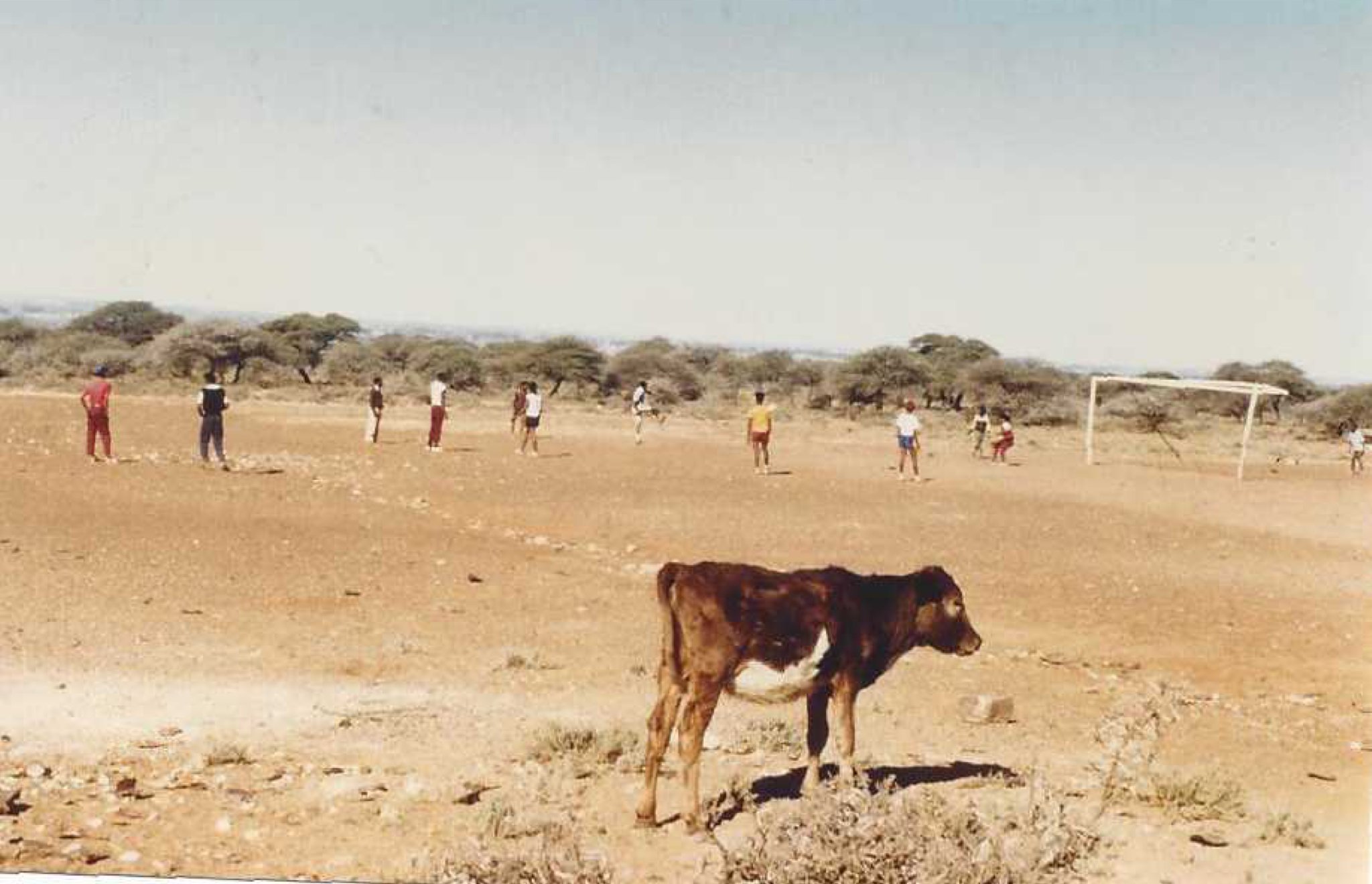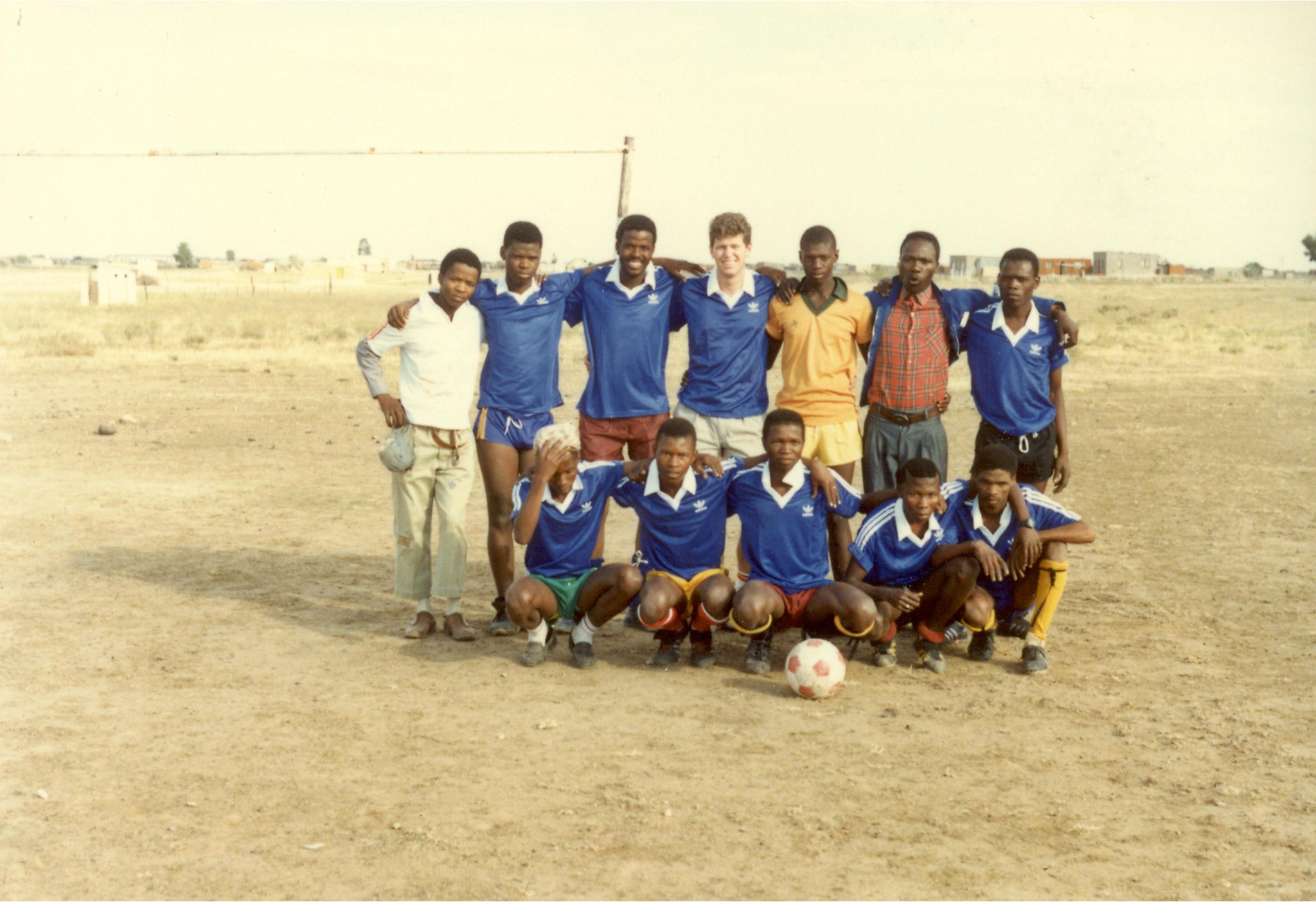Buxton Conviviality
Buxton was a tight community, and I was proud to wiggle my way into their social graces, sometimes without my students as the only ‘white’ man amongst them. “Mr. Jeff” was not just the boss from 8:00 groovy to 5:00 beer time at the Taung skull fossil site, but an integral part of local lifeways.
I once “owned” a soccer team. The “Taung Skull Football Club,” or TSFC as we called it, was a unique group. I ‘owned’ it because I bought the soccer ball, and the team was made up of those who worked with me on the Taung excavations. Although they lost every game in their first year, they were a spirited team, playing on a pure dirt pitch.
One of the TSFC members didn’t play, but was an integral part of the team. His name was Vincent, and he had a wooden leg. He cheered from the sideline like a champion, waving his cane in the air as he followed the team up and down the field. I might add that Vincent was a champion at our excavation as well, a true leader by example.
Despite Buxton being a tight-knit community, our arch-rivals in soccer were the ‘Buxton Tigers,’ led and financed by the richest man in Buxton. Lazarus owned the ‘taxi’ business from Buxton into the business center of Taung itself. His team was formidable to all teams in the region, because they had the best players of the village.
In the second season of the TSFC, I bought jerseys for the team out of my own pocket, not out of excavation funds, so my team ‘ownership’ status rose a bit. They recognized my love of them for all they had done for me. So they played harder on that desolate dusty landscape, but still lost time after time, and never came close to the Buxton Tigers.
That all changed one Saturday when a nearby team came by for the challenge. After a hard-fought battle, we won our first soccer match! Oh, and how the pride exuded. Vincent jumped up and down on his wooden leg. We all hugged and cheered in exultation, even though the win was only by one goal. It was our win.
And then the spontaneous victory parade began. The TSFC jumped upon the top of the dynamite truck, and others dancing the African toyi-toyi behind, we went on a victory tour through the village of Buxton.
What a moment! The women of the village, in rare appearances outside the home, came out to see what the commotion was all about, but smiled and cheered our parade. All absorbed the momentous occasion of our one-goal victory, a first for the TSFC.
Our parade, led by the dynamite truck with the team owner driving, came to a perfect fork in the dirt roads between the sheds where the people lived. I asked the person next to me in the cab, who happened to be Joseph Leeuw, “Which way do we go?” He gave the impossible answer of “go straight.” So I took the advice of Yogi Berra: “When you come to a fork in the road, take it.” I happened to go left which led us past many cheering women and children, whom I had never had the privilege to see, except for the few who had ventured up to the fossil site to bring lunches to their husbands.
The TSFC never beat the Buxton Tigers, but the Tigers never got as great a celebration as our small group of fossil excavators.
Miss Buxton
Right next to the ‘club house’ where my students and I stayed in Buxton, was the Hall. No fancy name, just the Hall, a remnant of the quarry operations who used it as a recreation hall. Every Saturday night, the Hall would come alive with loud music, dancing, and raucous, drunken behavior.
At first we thought it a nuisance, as the cacophony would continue throughout the night into the wee hours of the morning, making it difficult to sleep. But it wasn’t like we could ask them to turn it down. So it became clear that if you can’t beat ‘em, join ‘em.
Our first entry into the Hall was a bit awkward. We didn’t know how we would be received, and they didn’t quite know what to think of us. At least at first. But as soon as we were recognized and welcomed by some of our smiling workers, we knew we had found a new niche. Before long, we were dancing and drinking like we truly fit in. We were invited back every week.
It wasn’t always so smooth. Up at the fossil site I had always played music while we worked, so those who I employed knew my selections fairly well—mostly upbeat pop rock to keep a positive mood on site. One night around midnight they asked me to play some music for their dancing. I sent one of my students next door to the clubhouse to get a tape, and he quickly returned, grinning from ear to ear. We put in the tape, and loudly blaring throughout the hall was not one of my normal musical selections, but heavy metal. Bad heavy metal music. I’d never seen the Hall clear out so quickly. At least we got a bit more sleep that night.
The most interesting part of the Saturday evenings was the ‘Miss Buxton contest.’ There was one every week. We never found out what Miss Buxton actually won, but given the youth of the girls we suspected that it wasn’t a ‘prize’ worth keeping. “She’s so young, and FRESH,” one of my local friends told me of that week’s winner. But the contest itself was quite a spectacle.
The contestants would slowly promenade around the Hall, arm in arm with a broadly smiling gentleman with his chest pushed forward and his head held high. But with each step, one foot meeting the other before going on, the girls would hang their heads low and look as dour as possible. One can conjure up all sorts of hypotheses as to why this was the strategy, but certainly it was not chivalry.
As the winner was announced, the male escort would flash an ebullient smile, and Miss Buxton herself would not look displeased, but harbored a bit of a “so, whatever” look. Week after week, it was certainly fascinating to watch as the same pattern of events played out with a remarkable degree of consistency.
Sundays
Despite the late and raucous nights at the Hall, Sunday mornings were treated reverently. Although most held on to many of their more traditional African beliefs, such as the ‘snake’ that frightened them so, Buxton was a fiercely devout Christian community. So every Sunday one could hear across the village as the residents sang hymns in glorious harmony. With little or no instrumentation, the music they sang was nothing short of heavenly. They had grown up with a musical education by nature of the joy of harmony.
One day during a lunch break at the fossil site, I got together a few of the workers and played on our ubiquitous boom box the song ‘Barbara Ann’ by the Beach Boys. They liked it, so I asked if they could sing it, and played the tape again. They each intrinsically knew their roles in the harmonies, and they reproduced it perfectly. If only back then we had the technology of today, I’d be able to play you a video of smiling Tswana men singing “Ba Ba Ba Ba, Ba Barbra Ann ...” But I guess you had to be there.
After Sunday church the village became quiet, except around the water well where some were gathering their needs. Unless I had a fresh batch of students with me, I’d use Sunday afternoons to wander up to the fossil site. I’d study it from different lighting perspectives without the cacophony of piano jar roaring through sediments and people breaking rocks with mallets,

